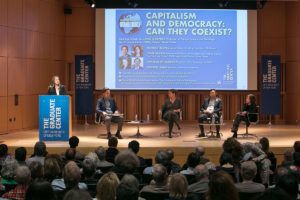On May 15, 2019, The Graduate Center brought together a group of scholars, entrepreneurs, and journalists to discuss the promises and perils of two of the West’s most vaunted principles — capitalism and democracy.
On the panel were Leslie McCall, presidential professor of sociology and political science and associate director of the Stone Center on Socio-Economic Inequality at The Graduate Center; Vanessa Williamson, a senior fellow at the Brookings Institution and author of Read My Lips: Why Americans Are Proud to Pay Taxes; and Andrew Yang, a tech entrepreneur, philanthropist, and founder of Venture for America.

Capitalism and Democracy: Can They Coexist? Panel at The Graduate Center, CUNY on May 15, 2019, here introduced by Janet Gornick.
Richard Reeves, senior fellow at the Brookings Institution, author of Dream Hoarders, and curator of the The Guardian’s “Broken Capitalism” series, served as moderator. Graduate Center Professor and Director of the Stone Center on Socio-Economic Inequality, Janet Gornick, introduced the event and the panelists.
Reeves opened by posing some pointed questions. Can capitalism and democracy actually coexist? And what is the relationship between economic and political systems? The discussion of these questions touched on globalization, technological change, markets and political failure, climate change, and universal basic income.
McCall highlighted the intrinsic tension between the principles animating capitalism and democracy: While capitalism encourages competition and thus trends towards inequality, democracy aspires to the equality of its citizens. She noted that economic inequality has been rising since the early 2000s, and while the public has long been concerned with increasing inequality, elites have consistently downplayed concern.
The panel engaged intensely over the question of who is to blame for persisting inequality: Is inequality an economic and market failure, or is it a political failure? Williamson stressed that markets are political constructs because they are framed by laws and rules that are political choices. Entire industries, like the cannabis industry, rise or fall based on political outcomes. Questions of pre-distribution and redistribution are political decisions.
Yang pointed toward the concept of a universal basic income as a way forward, which could resolve the tension between capitalism’s tendency to create disparities and democracy’s aspiration to equalize. Providing every citizen with a small income that is not means-dependent, he urged, could be a powerful tool to level out economic and political inequalities.
Watch the entire panel here.
